Abuse and safety
Key points about abuse and safety
- Abuse is defined as any action that intentionally harms or injures another person.
- Abuse is never okay.
- Find out about the different forms of abuse and where you can go to get support – whether you're being abused or are the abuser.
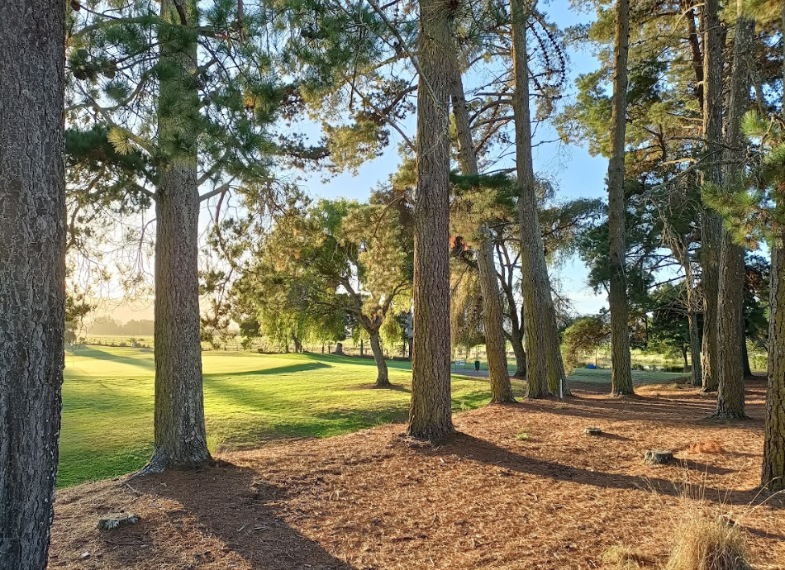
Abuse can happen to anyone of any age or gender and from any walk of life. No matter what your situation, you deserve to live without pain and fear.
Whether you’re the abused, the abuser or a concerned friend or family member, there’s help available. It’s not okay to abuse someone, but it’s okay to ask for help.
Learning about the different types of abuse and what you can do to stop or prevent abuse can make a difference in your own or someone else’s life.
Other people may be able to find out that you’ve been to this or other websites that talk about family violence. If you’re a victim of family violence or abuse, you can learn how to hide your visit by allowing private browsing (also called incognito mode) and how to clear your internet browser history.
An alternative is to switch to a private search engine that gives more secure browsing, such as DuckDuckGo.
If you’re worried that someone can access your private computer or is monitoring your internet usage, it might be better to use a computer at a friend’s house or at work, a library or an internet café.
It's never okay for anyone to use violence to hurt or control you
- Nobody has the right to assault another person.
- Nobody is allowed to have sexual contact with another person without their permission.
- Nobody has the right to use intimidation, threats or mind games to gain power over another person.
There are many types of abuse. These include:
- physical abuse
- sexual abuse
- psychological abuse
- financial abuse
- spiritual abuse (attacks to your wairua or spirit)
- neglect.
Read about examples of each type of abuse, including for people in rainbow relationships or with a disability.
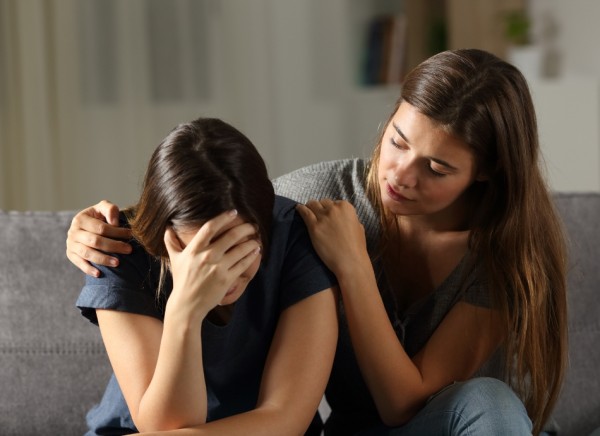
Image credit: Canva
Family violence is a crime
It can be carried out by anyone you’re in a domestic or close relationship with. They don't have to be living with you. It could be a:
- partner or ex-partner
- carer
- friend
- flatmate or family member.
Family violence is not a private matter. It’s one of Aotearoa New Zealand’s most serious social issues. Elder abuse is also a significant concern.
- Between 33 and 39% of New Zealand women experience physical or sexual violence from an intimate partner in their lifetime.
- Family violence is one of the main causes of injury and death to women.
- It also leads to short and long-term health problems such as mental illness, and problems with sexual and reproductive health.
- Children who live in a home where there is violence are at much greater risk of being the victims of physical, sexual and psychological abuse and neglect than other children.
Family violence is never your fault
If you are a victim of family violence or in a relationship that makes you scared about your own or anyone else's safety, seek help as soon as possible. You have the right to be safe.
You can use the Check it Out tool(external link) on the areyouok.nz(external link) website if you’re worried about how your partner or ex treats you and want to find out about abusive behaviours and how to find support.
Read more about family violence and where to get support for family violence.
If you are in immediate danger, call 111. You can ask for the police or an ambulance depending on your situation. They will respond straight away.
Other organisations and national helplines
See our family violence support page for other organisations that can help you and for information about national helplines that are available 24 hours a day.
The Women’s Refuge(external link), Shine(external link) and areyouok.org.nz(external link) helplines use the NZ Relay service(external link) so they're are accessible for people who are deaf, hard of hearing or speech impaired.
For longer term and ongoing protection
For longer term protection from a violent person, you can apply for an order:
- a Police Safety Order(external link) – this is to protect people at risk from violence, harassment or intimidation for up to 5 days, but is usually for just a day or two
- a Protection Order(external link) – this is longer-term protection from an abuser if you're in a domestic relationship with them
- a Restraining Order(external link) if you're not in a relationship with the person abusing you
- if children are involved you can also apply for an urgent parenting order(external link) (without notice).
If you're a friend or acquaintance of a victim of family violence, you can help by listening and being supportive, making sure the person and any children are safe, and finding out what help is available in the community. It's okay to get involved – you could save a life.
Find out how to reach out yourself and when you should call the police(external link).
For concerns about child abuse and neglect
- Contact Oranga Tamariki(external link) on 0508 326 459 or email [email protected]
- Visit the Safeguarding Children website(external link) to learn more about how to:
- trust your instincts
- document details
- report your concerns
- maintain confidentiality
- offer support
- follow up.
Apps reviewed by Healthify
You may find it useful to look at the Bright Sky NZ app and some first aid and emergency apps and mental health and wellbeing apps.
Video: Whānau violence is not traditional for Māori
(New Zealand Police, NZ, 2018)
Video: Stan Walker hopes to help others with raw, real biography - “I’ve got one time to say everything” - Personal story
In this video Stan Walker talks about his book "Impossible". Stan writes about abuse and addiction, hardship and excess, cancer and discrimination, and growing up in a family where love and violence were horribly entwined.
(Te Karere TVNZ, NZ, 2020)
Video: Signs of domestic violence
(NHS, UK, 2019)
Video: Talking about family violence: Women talk about types of abuse - Family violence: a series of videos
People who’ve been affected by family violence speak about their experiences in a set off 11 videos(external link). The first one is included below.
(Ministry of Justice, NZ, 2019)
Breaking Silence: a series
This TV series(external link) about domestic abuse in Aotearoa New Zealand will change the way you think about violence towards women. Made with the support of New Zealand On Air.
Family violence – it’s not OK(external link) Information about family violence, what it is and where to get help.
Family violence(external link) Ministry of Justice, NZ
Domestic violence(external link) Women's Refuge, NZ
Rape Prevention Education(external link) Education about rape prevention and support for survivors of sexual abuse
Te Kupenga Whakaoti Mahi Patunga National Network of Stopping Violence Services(external link) Bicultural national anti-violence organisation
Help for family violence(external link) NZ Police
Abuse and violence(external link) Skylight, NZ
Apps/Tools
Check it out tool(external link)
Bright Sky NZ app
First aid and emergency apps
Mental health and wellbeing apps
Brochures
Keeping safe feeling safe [PDF, 8.7 MB] People First, NZ, 2021
Are you OK?(external link) It's not OK, NZ
About family violence and protection orders(external link) Ministry of Justice, NZ, 2019
Family violence – children get hurt(external link) Brainwave, NZ, 2020
Family violence translations of standard family violence terms(external link) Ministry of Justice, NZ
Aroha in action – a resource for whānau [PDF, 5 MB] Di Grennell, NZ
Domestic violence and disabled people(external link) Mental Health Foundation, NZ
Break free – a practical handbook for migrant and refugee youth breaking free from family violence(external link) Shakti Youth, NZ, 2017 (This handbook is free for young people accessing Shakti’s services or it can be ordered online for $40 per copy)
Our culture, our pride – no excuse for abuse(external link) Shakti, NZ, 2014 (Order online)
Abuse in multiple languages(external link) Health Translations, Australia (Note: This resource is from overseas so some details may be different in New Zealand, eg, phone 111 for emergencies or, if it’s not an emergency, freephone Healthline 0800 611 116)
References
- Fanslow J, Robinson E. Violence against Women in NZ – prevalence and health consequences(external link)(external link) NZMJ 2004;117(1206
- Family violence – it’s not OK(external link) NZ
Family violence assessment and intervention guideline – child abuse and intimate partner violence(external link) Health New Zealand | Te Whatu Ora, 2016
Abuse and neglect of children(external link) Starship Children's Hospital, NZ, 2021
Domestic Violence Act 1995(external link) Parliamentary Council Office, NZ, 2019
Detecting child abuse in general practice(external link) BPAC, NZ, 2011
Vine – Violence Information Aotearoa(external link) National centre for family violence and sexual violence research and information in Aotearoa New Zealand
NZ Family Violence Clearinghouse(external link) National Centre for Collating and Disseminating Information about Domestic and Family Violence in New Zealand
Short J, Cram F, Roguski M, et al. Thinking differently – re‐framing family violence responsiveness in the mental health and addictions health care context(external link) Int J Ment Health Nurs. 2019 Aug 23
Brochures
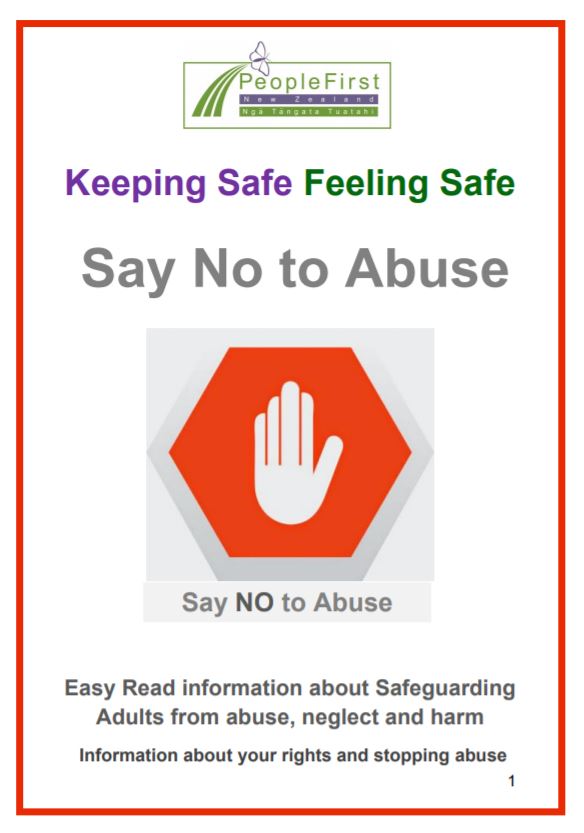
People First, NZ, 2021
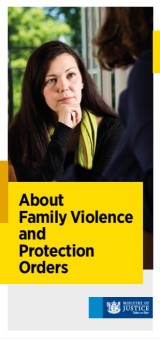
Ministry of Justice, NZ, 2019
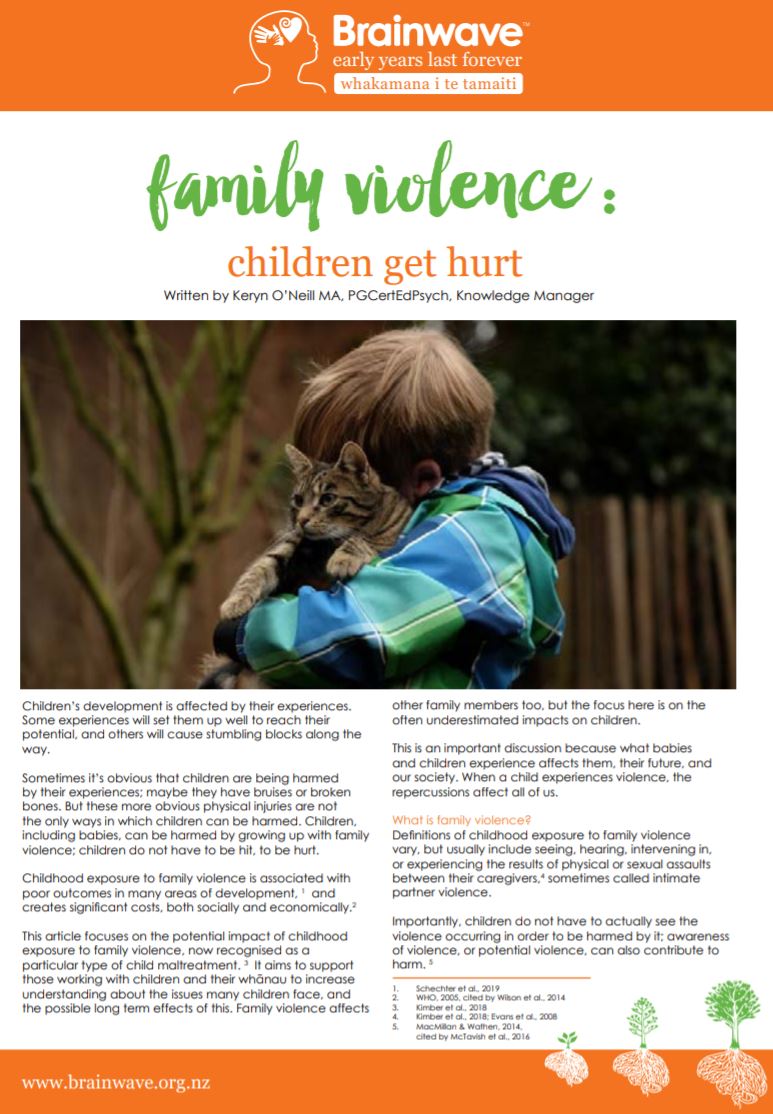
Brainwave, NZ, 2020
Credits: Healthify editorial team. Healthify is brought to you by Health Navigator Charitable Trust.
Reviewed by: Sarah Hyder, Clinical Nurse Manager, Motueka
Last reviewed:





